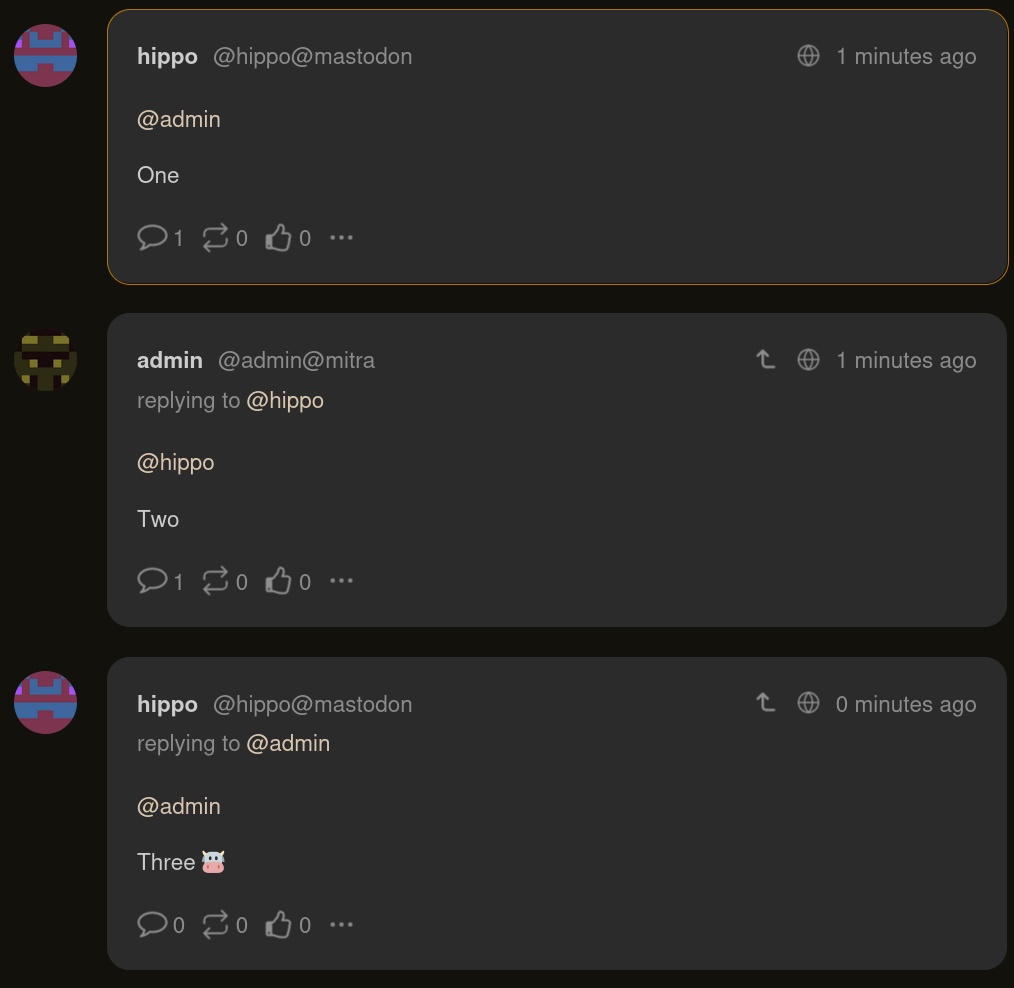Fediverse-pasture
Fediverse applications that you can run local to have easily deployable versions to test/develop against.
Quick start
Download the archive
First download the archive and unzip it
curl -o fediverse-pasture.zip\
https://pasture.funfedi.dev/assets/fediverse-pasture.zip
unzip fediverse-pasture.zip
Create the docker network
The fediverse pasture uses the docker network fediverse-pasture as an
external resource. It has thus to be created via
Run an application
You can start your application of choice via
The containers will take a while to startup and automatically create a user with credentials. The port being forwarded to localhost depends on the application, so all of them can be run in parallel.
| Forwarded address | Username | Password | Actor Handle |
|---|---|---|---|
| http://localhost:2975/ | witch |
password |
witch@akkoma |
Info
cattle_grid is different than other Fediverse applications. It tries to be a middleware that does some stuff and not others. So what is presented here is a demo connection based on the RabbitMQ Web MQTT plugin.
| Websocket | Username | Password | Actor Handle |
|---|---|---|---|
ws://localhost:15675/ws |
guest |
guest |
`guest@cattle_grid |
One can use MooQTT to connect to this socket.
| Forwarded address | Password | Actor Handle | |
|---|---|---|---|
| http://localhost:2985/ | friend |
jaudfahkd |
friend@friendica |
| Forwarded address | Password | Actor Handle | |
|---|---|---|---|
| http://localhost:2983/ | g@gancio.io |
password |
relay@gancio |
| Forwarded address | Password | Actor Handle | |
|---|---|---|---|
| http://localhost:2978/ | cookie@gts |
PaSs123$abc&* |
cookie@gts |
Warning
Gotosocial does not come with an UI. Checking /admin can lead to weird errors. Checking with
alternative interfaces was not done.
| Forwarded address | Password | Actor Handle | |
|---|---|---|---|
| http://localhost:2981/ | john@example.com |
password |
john@hollo |
| Forwarded address | Password | Actor Handle | |
|---|---|---|---|
| http://localhost:2970/ | hippo@mastodon.localhost |
password |
hippo@mastodon |
| Forwarded address | User | Password | Actor Handle |
|---|---|---|---|
| http://localhost:2980/ | oscar |
grouch |
oscar@mbin |
Warning
You currently need to create a magazine manually, see containers#54
| Forwarded address | Username | Password | Actor Handle |
|---|---|---|---|
| http://localhost:2973/ | kitty |
password |
kitty@misskey |
| Forwarded address | Username | Password | Actor Handle |
|---|---|---|---|
| http://localhost:2976/ | admin |
password |
admin@mitra |
| Forwarded address | Password | Actor Handle | |
|---|---|---|---|
| http://localhost:2984/ | rose@frama |
password |
rose@mobilizon |
| Forwarded address | Username | Password | Actor Handle |
|---|---|---|---|
| http://localhost:2972/ | full |
password |
full@pleroma |
| Forwarded address | Username | Password | Actor Handle |
|---|---|---|---|
| http://localhost:2974/ | willy |
password |
willy@sharkey |
Talking to each other
As mentioned before, it is possible to run the various Fediverse applications in parallel. For example
will start both a Mastodon and Mitra instance. The command will finish once both
servers are running, due to the --detach flag. The accounts can then be accessed
using the login information above and by mentioning admin@mitra respectively
hippo@mastodon, they can message each other.
Tip
It may take a few seconds after the docker compose command finishes for messages to be actually delivered. Similarly, the processing between sending a message in one window and it arriving in the second, can take a few seconds.
Generating traffic with the pasture container
By running
we start the misskey container and then log in at
http://localhost:2973/ with credentials
kitty and password. After clicking through the popups.
By running
one can then send a "Hello World" message to misskey. This message will appear in the global timeline.
Docker networking
All containers are configured with the network fediverse-pasture via
So if you want to test your own implementation against these, you have to specify this networks. The hostnames correspond to the application names.
Technical comments
The containers used in the fediverse-pasture are build here. The reason for using custom containers is explained below. The docker files are available in the repository.
Running different versions
By default the latest versions available here
will be used. By specifying the environment variable VERSION another versions can be
run. For example to run Mastodon v4.1.16 run
Difference to production versions
The containers and docker compose files used here should be not used for production, a few reasons:
- Users, passwords and access tokens are created automatically and set to default values
- Servers are adapted to use HTTP. This makes local usage easier, and allows debugging of HTTP requests through packet capture
- Databases are in a volatile state and are deleted with their docker container
Repository and testing
One can clone the repository containing the docker compose files via
By running ./test.sh one can ensure that the docker compose files are valid
and that the network configuration is correct.
The tests automatically run in CI:
Funding
This code was created as part of Fediverse Test Framework.
A project funded through the NGI0 Core Fund, a fund established by NLnet with financial support from the European Commission's Next Generation Internet programme, under the aegis of DG Communications Networks, Content and Technology under grant agreement No 101092990.
